Managing Psoriasis Flare-Ups: Tips for Seniors
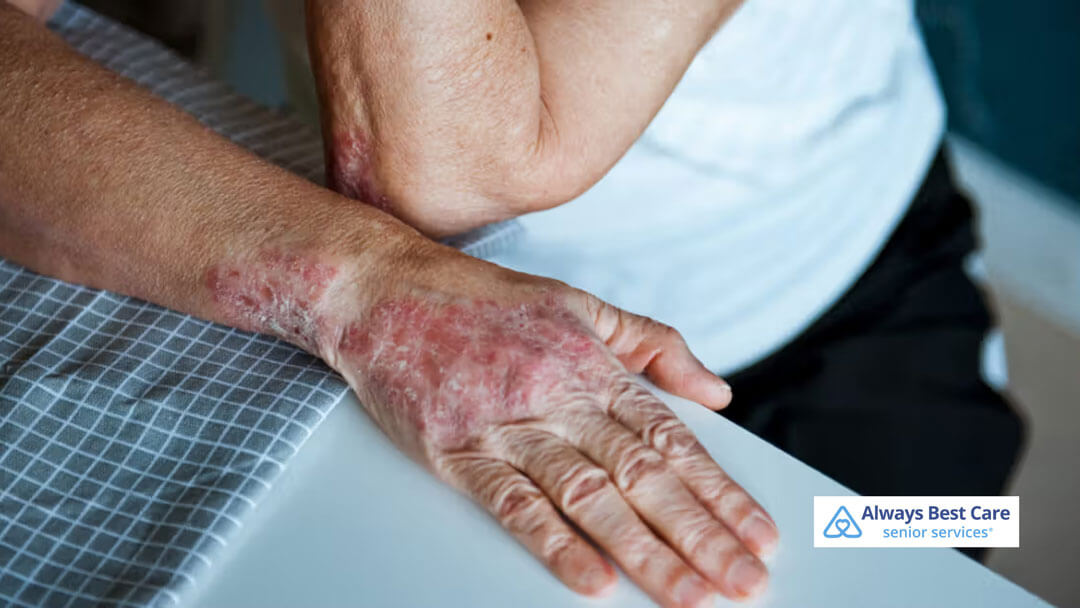
Psoriasis, a chronic autoimmune condition, affects approximately 7.5 million adults in the United States, many of whom are seniors. As people age, managing psoriasis can become more challenging due to changes in skin health, immune function, and lifestyle. Flare-ups can lead to itching, pain, and emotional distress, but with the right strategies, seniors can effectively manage their symptoms and maintain a high quality of life. This guide provides practical tips for seniors to navigate and minimize psoriasis flare-ups, ensuring better skin health and overall well-being.
Table of Contents
Understanding Psoriasis
Psoriasis is a chronic condition characterized by the immune system mistakenly attacking healthy skin cells, causing them to reproduce too quickly. This rapid cell turnover results in a build-up of cells on the skin’s surface, leading to scales and red patches that can be itchy and sometimes painful.
Recognizing Symptoms and Triggers
Understanding the symptoms and triggers of psoriasis is crucial for effective management. Here’s a breakdown of the common symptoms and triggers:
Common Symptoms
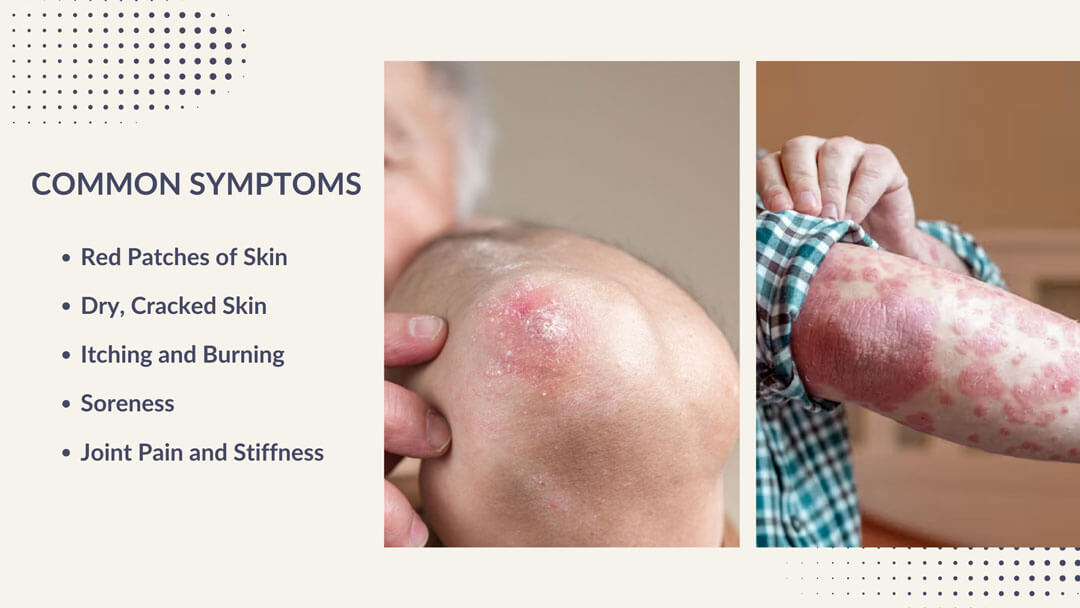
- Red Patches of Skin: Psoriasis often presents as red patches of skin covered with thick, silvery scales. These patches can appear anywhere on the body but are most commonly found on the scalp, elbows, knees, and lower back.
- Dry, Cracked Skin: The affected areas of the skin may become dry and cracked, sometimes leading to bleeding. This dryness can cause discomfort and make the skin more susceptible to further irritation.
- Itching and Burning: Psoriasis patches can be itchy and cause a burning sensation. This itching can be intense and lead to scratching, which can worsen the condition.
- Soreness: The affected areas may also be sore, adding to the discomfort and impacting daily activities.
- Joint Pain and Stiffness: Psoriatic arthritis is a common complication of psoriasis, leading to joint pain, stiffness, and swelling. This can affect mobility and overall quality of life.
Common Triggers
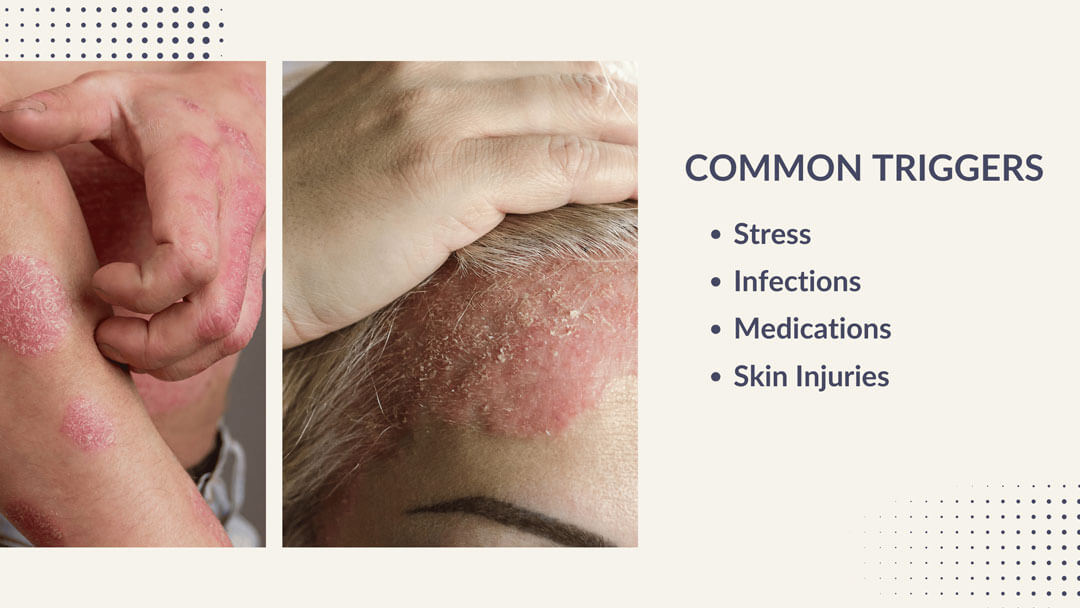
- Stress: Both physical and emotional stress can trigger or worsen psoriasis symptoms. Managing stress through relaxation techniques and stress-reducing activities can help minimize flare-ups.
- Infections: Certain infections, such as strep throat, can trigger psoriasis outbreaks. It’s important to maintain good hygiene and take preventive measures to avoid infections.
- Medications: Some medications, including lithium, antimalarials, and beta-blockers, can provoke psoriasis symptoms. If you suspect a medication is affecting your psoriasis, consult with your doctor for alternatives.
- Skin Injuries: Any injury to the skin, including cuts, scrapes, or severe sunburn, can lead to a psoriasis outbreak, known as the Koebner response. Protecting your skin from injury is essential in managing psoriasis.
By recognizing these symptoms and identifying triggers, seniors can take proactive steps to manage their psoriasis effectively. This awareness allows for better prevention and timely intervention, significantly reducing the frequency and severity of flare-ups.
Strategies for Avoiding Common Triggers
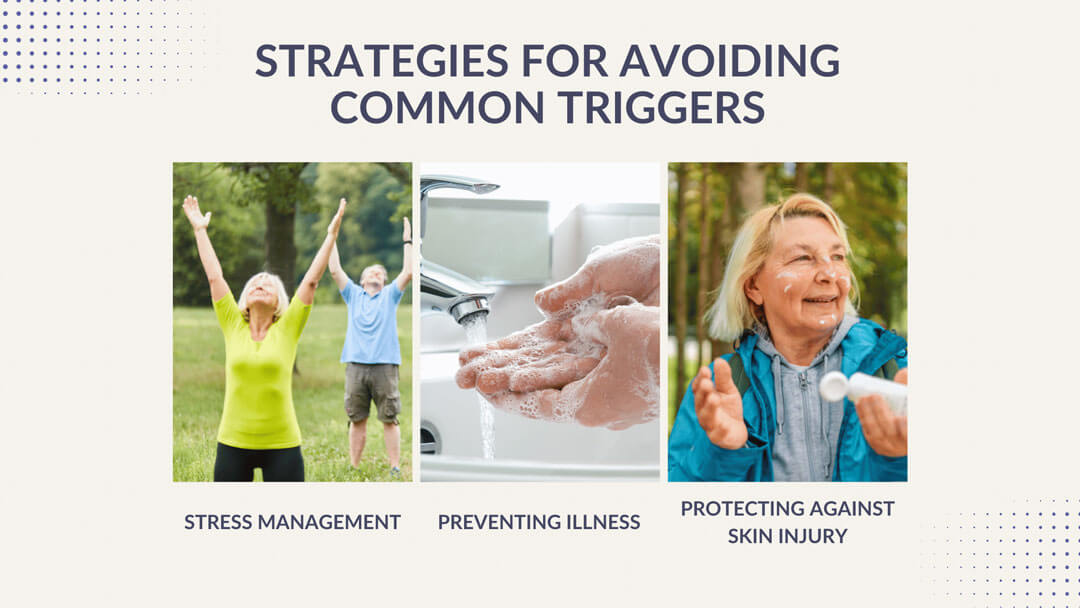
Managing psoriasis effectively often involves identifying and avoiding specific triggers that can lead to flare-ups. By understanding what can exacerbate psoriasis, seniors can take proactive steps to mitigate these factors. Here are some common triggers and practical strategies to avoid them:
Stress Management
Stress is a significant trigger for psoriasis flare-ups. To manage stress, seniors can incorporate relaxation activities into their daily routines, such as meditation, deep breathing exercises, yoga, or journaling. Regular breaks to engage in relaxation activities can also be beneficial. Additionally, surrounding oneself with a calming environment and supportive people can help mitigate stress.
Preventing Illness
Preventing infections is crucial in managing psoriasis. Seniors should avoid close contact with sick individuals and practice frequent hand washing. Regularly disinfecting high-contact surfaces can reduce the risk of infection. Boosting the immune system by including immune-boosting foods in the diet and addressing any illness promptly can further help in preventing flare-ups.
Protecting Against Skin Injury
Protecting the skin from injury is essential in managing psoriasis. Seniors should use sunscreen and wear light layers to shield their skin from harmful UV rays. To prevent bug bites, applying bug repellent and using natural deterrents like citronella candles can be effective. Being mindful of surroundings to avoid cuts and scrapes can also help prevent psoriasis outbreaks.
Weather-Related Precautions
Weather changes, especially during winter, can exacerbate psoriasis symptoms. Combat dry indoor air by using a humidifier to add moisture. Regularly applying lotion can prevent dryness and keep the skin hydrated. In cold weather, wearing warm clothing and layering up can protect the skin from harsh conditions.
Managing Psoriasis Flare-Ups
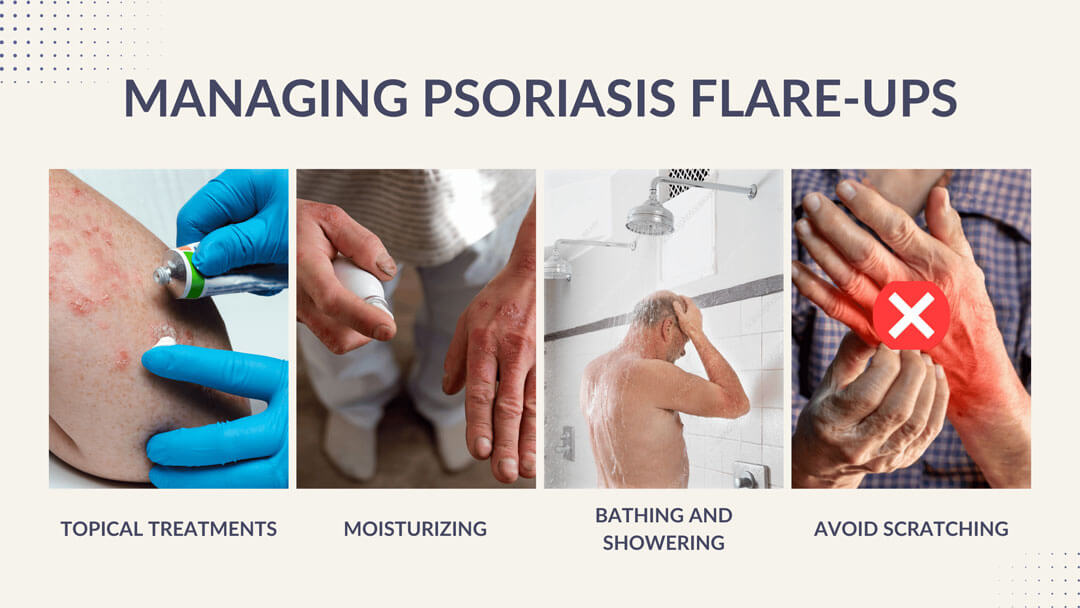
Managing psoriasis can become increasingly challenging as we age due to changes in skin health, immune function, and overall lifestyle. However, with the right strategies, seniors can effectively manage their symptoms and maintain a high quality of life. Here are some tips to help manage psoriasis flare-ups:
Topical Treatments
Using prescribed ointments can help alleviate itching and reduce skin cell build-up. These ointments, which may contain steroids, vitamin D, or salicylic acid, should be applied according to the doctor’s instructions to avoid side effects. Following the prescribed application routine is crucial, especially given the sensitivity of aging skin.
Moisturizing
Keeping the skin hydrated is vital for seniors with psoriasis. Using nourishing lotions specifically designed for psoriatic skin can maintain moisture and prevent irritation. Thicker, emollient-rich creams provide longer-lasting hydration compared to lighter lotions. Incorporating a moisturizing routine in the morning and evening can help keep the skin supple and reduce flare-ups.
Bathing and Showering
Opting for warm instead of hot water when showering or bathing can prevent further irritation. Limiting shower time to 10 minutes or less and using gentle, hypoallergenic cleansers can also help. Applying moisturizer immediately after bathing locks in moisture and keeps the skin hydrated.
Avoiding Scratching
Scratching can worsen psoriasis, so it’s important to keep the skin well-hydrated to reduce itching. Applying a cold compress can provide relief from itching. Engaging in activities that distract from the urge to scratch can also help manage discomfort. Wearing soft, breathable fabrics and maintaining short nails can minimize damage caused by accidental scratching.
Embracing a Healthy Lifestyle

Living a healthy lifestyle is an essential component in managing psoriasis. Adopting regular exercise and a balanced diet can significantly reduce the severity of flare-ups and improve overall well-being for seniors.
Regular Exercise
Regular exercise can reduce stress, improve overall health, and boost the immune system. Low-impact activities such as walking, swimming, or yoga can particularly benefit seniors, promoting both physical and mental well-being.
Balanced Diet
Eating a balanced diet rich in anti-inflammatory foods supports skin health. Seniors should incorporate fruits, vegetables, lean proteins, and whole grains into their diet. Foods high in omega-3 fatty acids, such as salmon, flaxseeds, and walnuts, can help reduce inflammation and improve skin health.
Support from Always Best Care

At Always Best Care, we understand the unique challenges seniors face in managing psoriasis. Our compassionate caregivers provide personalized support to help maintain health and well-being. Whether you need assistance with daily skincare routines, medication management, or emotional support, we’re here to help.Partnering with an in-home care provider can help you manage psoriasis flare-ups effectively. Caregivers assist in avoiding triggers, caring for your skin, and following your physician’s orders. They can also help with various tasks when you’re experiencing a flare-up and might not be feeling your best. Contact Always Best Care of Milwaukee at (262) 668-8139 to learn more and schedule your free consultation.





